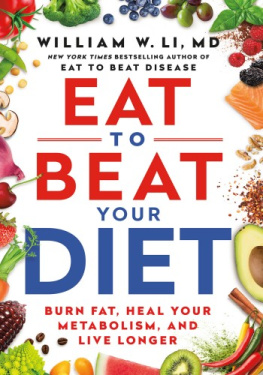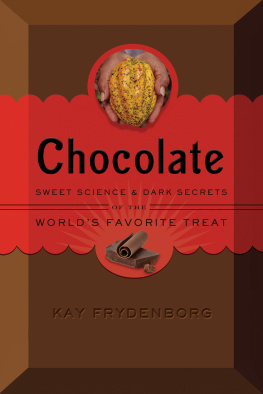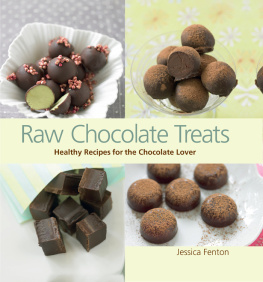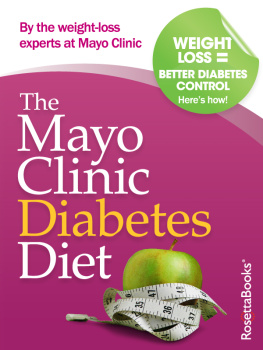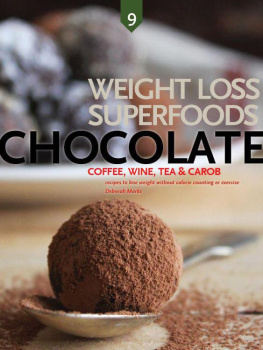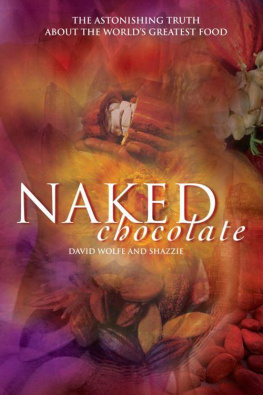To my sweet mom. Thank you for everything; I love you.
This book is intended as a reference volume only, not as a medical manual. The information given here is designed to help you make informed decisions about your health. It is not intended as a substitute for any treatment that may have been prescribed by your doctor. If you suspect that you have a medical problem, we urge you to seek competent medical help.
The information in this book is meant to supplement, not replace, proper exercise training. All forms of exercise pose some inherent risks. The editors and publisher advise readers to take full responsibility for their safety and know their limits. Before practicing the exercises in this book, be sure that your equipment is well-maintained, and do not take risks beyond your level of experience, aptitude, training, and fitness. The exercise and dietary programs in this book are not intended as a substitute for any exercise routine or dietary regimen that may have been prescribed by your doctor. As with all exercise and dietary programs, you should get your doctors approval before beginning.
Mention of specific companies, organizations, or authorities in this book does not imply endorsement by the author or publisher, nor does mention of specific companies, organizations, or authorities imply that they endorse this book, its author, or the publisher.
Internet addresses and telephone numbers given in this book were accurate at the time it went to press.
Direct exclusive edition will be published by Rodale Inc. in January 2014.
2013 by Will Clower, PhD
All rights reserved. No part of this publication may be reproduced or transmitted in any form or by any means, electronic or mechanical, including photocopying, recording, or any other information storage and retrieval system, without the written permission of the publisher.
Book design by Elizabeth Neal
Library of Congress Cataloging-in-Publication Data is on file with the publisher.
ISBN 9781623361273 hardcover
ISBN: 9781623361280 ebook

We inspire and enable people to improve their lives and the world around them.
rodalebooks.com
Contents
Acknowledgments
I would like to acknowledge the fact that there are people I love who have all contributed in ways, large and small, visible and invisible, to this work. I so appreciate the opportunity to express the gratitude I feel and that all too often goes unspoken. I would not be who I am and do what I do if it were not for the family love that surrounds me every day with the friendship and affection, the laughter and love, that defines who we are together. Thank you, Ben, Grace, and Dottie for my life.
I am grateful to friends and coworkers who help me keep my head on my shoulders and have provided critical support while writing this book: Rita Madden, Laura Todd, and Anthony McKee.
Thank you to my friend Paul Morrison, whose keen actuarial eye combined with his own cooking skill helped focus my recipes into vastly better products.
Finally, let me say that I cannot imagine working with a better editor. Lora Sickora has been positive and supportive and has helped to keep me from rambling when I ramble and prodded me to provide detail where needed. Thank you.
Introduction
W hat is a health food? Normally, this question conjures up thoughts of broccoli, brussels sprouts, celery sticks, etc. But have you noticed that chocolate never makes the list? The reason for this is that weve been coached by our culture to think about healthy foods in a completely wrongheaded way. For example, you commonly hear that chocolate is a guilty pleasure that is bad for you. Of course, that doesnt stop you: You eat it anyway, absorbing all that guilt with all that pleasure. So how did something as deliciously wonderful as chocolate get to be the bad guy? Why have we come to believe that everything fabulous must be unhealthy and that good for your soul must mean bad for your body?
I do not accept that notion. Believe it or not, chocolate is an amazing health food that is as good for your physical heart as it is for your emotional heartand, yes, it can even be good for your waistline, too!
CHOCOLATE and the PR Problem
Chocolate doesnt exude malevolent health waves into the air, requiring a culinary version of a Geiger counter to sniff out the chocolaty particles before they sicken you. Nor will it make you unhealthy if you eat a milligram of it, or even a gram of it. And just as healthy people all over the earth have encouraged chocolate consumption for thousands of years, we should promote this amazing health food as a staple element of any diet.
Does that mean chocolate is a miracle food that you can eat buckets of and still be superthin and healthy? Of course not. Chocolate, like everything else, becomes bad for you when its eaten with abandon: brilliant for you at one volume, awful for you at another. And the good news is that the volume of chocolate consumed, which determines whether it swings from good for you to bad for you, is completely up to you.
The bottom line is that we have a serious cultural PR problem, and that stands for personal responsibility. For the past 40 years, weve been told that eating eggs was going to kill us. We were told that butter was bad, that carbs were bad, that wine was bad, that beer was bad, that pizza was bad, and on and on and on. But wine actually has wonderful resveratrols, beer has beneficial B vitamins, pizza is composed of the same veggies (with all of their vitamins)tomatoes with beneficial lycopenes, and the crust with its fiberrecommended by the USDA, and even butter has vitamins A and E and selenium (which doctors prescribe for heart health).
So while youve been told that these foods were unhealthy for you, thats not necessarily true. Food doesnt become good or bad for you until you eat it in a way thats either in control or out of control. And that is especially true of chocolate. Of course, this basic fact leads to a logical conclusion that is both good news and bad news at the same time: Whether your chocolate helps you live 10 extra years or makes you pack on 10 extra pounds is totally up to you. Many will see this as great news, because you get to be in control and determine if chocolate will be a health food. However, this also means that any weight gain brought about by chocolate has zero to do with the chocolate and everything to do with how it was eaten.
So dont have a PR problem. Own your health by taking responsibility for your eating behavior. This requires that we think differently about our food. Forget the advice of this disordered culture of health that says youre a food victim. Instead of an abstinence approach (avoid all chocolate because it can make you fat), we are going to adopt a responsibility approach: Eat the right kind of chocolate, in control. When you do this, you will get all the health benefits without eating so much that you make it bad for you.
Own Your Own Health with CHOCOLATE
Now is the time to finally own your own health, and chocolate is the perfect food to practice with. But to do that, we must have the courage to confront our culture of health, which defines what we believe about food and feeding, home and hearth, cooking and consumption. In nearly every ad and article, our culture encourages the confusion of volume and value; pushes cost-cheap, nutrient-cheap foods at us; and confuses the love of food with the love of consumption. As a result, we end up way overfed and way undernourished. Managing this roil of influences is like going for a dip in Class V rapids: Before you even know what has happened, you are lifted and tumbled and turned right over the dietary cliff.


